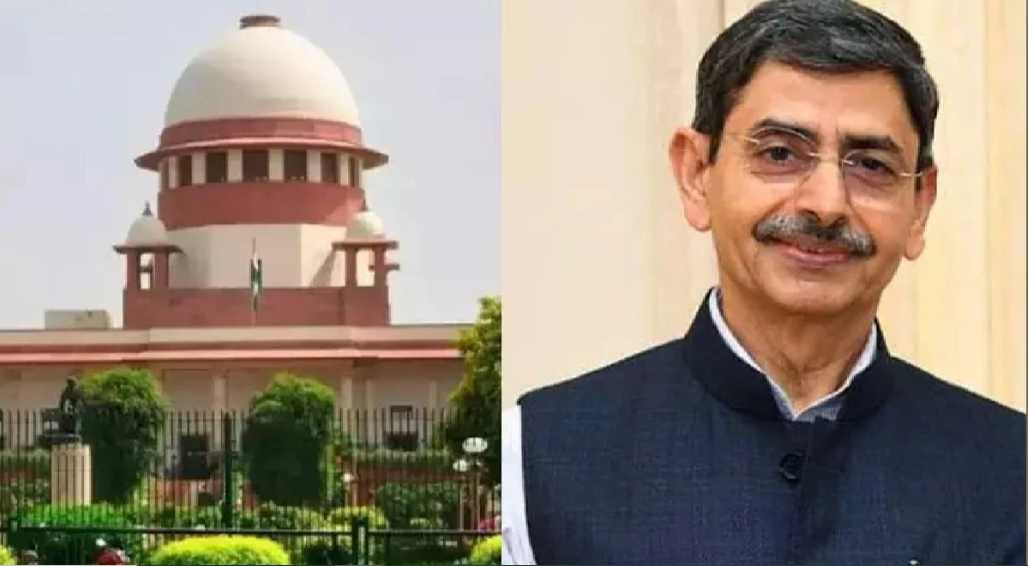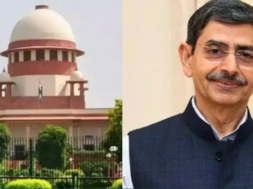
Manas Dasgupta
NEW DELHI, Apr 8: In a massive win for the DMK government in Tamil Nadu, the Supreme Court on Tuesday in an order that will have its repercussions in other states also, lambasted the governor R N Ravi declaring his action in sitting over 10 bills indefinitely as “illegal” and “arbitrary” and fixed a timeframe for the governors to decide on bills passed by the state Assembly.
The bench of Justice JB Pardiwala and Justice R Mahadevan ruled that the Governor cannot reserve Bills for the President after withholding assent and said all the bills would be deemed to have received assent of the governor the day the bills were re-submitted by the government after the Assembly passed the bills the second time.
“The action of the Governor to reserve the 10 bills for the President is illegal and arbitrary. Thus, the action is set aside. All actions taken by the Governor thereto for the 10 bills are set aside. These Bills shall be deemed to be cleared from the date it was re-presented to the Governor,” the court said and added that the Governor Ravi did not act in “good faith.”
Tamil Nadu Chief Minister and DMK chief MK Stalin described the verdict as “historic.” Speaking in the State Assembly, Mr Stalin informed the House of what he called “good news,” saying that the Tamil Nadu government had received a historic judgment from the top court. He noted that the Governor had returned several Bills passed by the Assembly without granting assent.
“Tamil Nadu government initiated a case against this before the Supreme Court. The court said the Governor withholding Bill is illegal. This is a big victory not only for Tamil Nadu but for all the States in India. This judgment is a victory for all the State governments,” he added. “It’s a big victory not just for Tamil Nadu but for all Indian states. DMK will continue to struggle for and win state autonomy and federal polity,” he said.
The apex court declared that any actions taken by the President regarding the ten bills in question are legally invalid and further ruled that the ten Bills should be deemed to have received the Governor’s assent on the date they were re-submitted following their re-passage by the Tamil Nadu Legislative Assembly.
“The action of the Governor to reserve the 10 bills for the President is illegal and arbitrary. Thus, the action is set aside. All actions taken by the Governor thereto for the 10 bills are set aside. These Bills shall be deemed to be cleared from the date it was re-presented to the Governor,” the bench said.
The Governor, the court said, should have cleared the Bills when they were re-presented to him after being passed by the Assembly again. Article 200 of the Constitution lays down the options before the Governor when a Bill passed by the state House is presented before him. The Governor can give his assent, withhold assent, or reserve the Bill for consideration of the President. The Governor can send the Bill back to the House or Houses for the reconsideration of some provisions. If the House passes it again, the Governor shall not withhold assent. The Governor can reserve for the President’s consideration a Bill which he/she feels is at odds with the Constitution, directive principles of state policy, or is a matter of national importance.
The court prescribed timelines to exercise these options and said missing these timelines would invite judicial scrutiny of the Governor’s action. The court has earmarked a one-month deadline for Governors to withhold assent to a Bill and reserve it for the President’s review with the aid and advice of the Council of Ministers. When a Bill is reserved without the aid and advice of the Council of Ministers, this deadline will be three months. If a Bill is presented to a Governor after reconsideration by the state Assembly, he/she must clear it within a month. Any exercise of the Governor under Article 200, the court said, is amenable to judicial review.
The court clarified that it is “in no way undermining the Governor’s powers.” “All actions of the Governor must align with the principle of parliamentary democracy.”
A former IPS officer who has also worked in the Central Bureau of Investigation (CBI), RN Ravi took over as Tamil Nadu Governor in 2021. Ever since, he has had frosty ties with the MK Stalin-led state government. The DMK government has accused him of acting like a BJP spokesperson and blocking Bills and appointments. The Governor has said the Constitution empowers him to withhold his assent to legislation.
The state government and Raj Bhavan have also clashed during the Governor’s customary address to the Assembly. Last year, the Governor walked out in protest of the National Anthem not being sung at the beginning of the address. As per tradition, the state anthem Tamil Thai Valthu is sung when the House meets and the National Anthem at the end. But Governor Ravi took exception and said the national anthem should be sung at both times. In 2023, Governor Ravi refused to deliver the customary address to the Assembly and said the draft had “numerous passages with misleading claims far from truth.” The year before that, he refused to read parts of the speech that had the names of BR Ambedkar, Periyar, CN Annadurai, the phrase ‘Dravidian Model’ and some references to law and order in Tamil Nadu.
The Bills in question include significant amendments to how vice-chancellors are appointed to state universities. The Madras University (Amendment) Bill, Tamil Nadu Agricultural University (Amendment) Bill, and Tamil Nadu Dr Ambedkar Law University (Amendment) Bill, among others, transferred the power of appointing vice-chancellors from the Governor — who traditionally serves as the Chancellor at these institutions — to the state government.
Other Bills, passed between 2022 and 2023, include the Tamil Nadu Dr M G R Medical University (Amendment) Bill, the Tamil University (Amendment) Bill, the Anna University (Amendment) Bill, a second amendment to the Veterinary University Act, and a Bill to create a new Siddha Medical University near Chennai.
Two Bills, passed in January 2020 under the previous AIADMK government, proposed structural changes in the Tamil Nadu Fisheries University and the Tamil Nadu Veterinary and Animal Sciences University, including giving the government powers of inspection and administrative oversight and renaming the fisheries university after former CM J Jayalalithaa.
The petition, when it was moved in the apex court in 2023, listed not just the 10 pending Bills, but also cited delays in signing remission orders for over 50 prisoners, in approving crucial appointments — including to the Tamil Nadu Public Service Commission (TNPSC) — and in giving consent to prosecute former ministers and MLAs facing corruption charges.
Among the more sensitive issues was the delay in processing remission files for 38 prisoners, including 16 Muslim convicts. The delay triggered political backlash, with the opposition AIADMK accusing the ruling DMK of selective action. The government maintained it had sent the files to the Governor, where they remained unacted upon.
Also pending were proposals to fill TNPSC vacancies. The commission, which is mandated to have a Chairperson and 14 Members, was functioning with just four Members — one of whom was holding the additional charge of the Chairperson. The petition said the Governor raised “dubious queries” to delay the appointment process, despite being provided with necessary clarifications and supporting regulations.
Collectively, these Bills represented a quiet but pointed challenge to the Governor’s traditional control over public universities — one of the few remaining spheres where Governors retain substantial influence despite holding a largely ceremonial position under the Constitution.
While the Assembly passed these Bills after due legislative procedures, they were neither signed nor formally rejected by Governor Ravi. The state government accused the Governor of stalling the legislation and interfering with the democratic process. In October 2023, Tamil Nadu filed a writ petition in the Supreme Court alleging “inaction, omission, delay, and failure” on the part of the Governor, resulting in a breakdown of administrative operations.
According to the petition, the Governor’s refusal to act went beyond delay and amounted to a “malafide exercise of power” to obstruct legislation that sought to reduce his own role in state governance.
The confrontation reached a new pitch in November 2023. Just days after the Supreme Court flagged “serious concern” about Raj Bhavan inaction in multiple states, Governor Ravi returned all 10 Bills to the Assembly. Though the move broke the deadlock, it was criticised as being reactive and constitutionally insufficient.
The Tamil Nadu Assembly convened a Special Session on November 18, 2023, under Rule 26, specifically to re-pass the returned Bills. Speaker M Appavu said the re-passed Bills would now require the Governor’s assent as per constitutional protocol. The session, he had said, would not entertain discussion on the judiciary, the Governor, or the President — its focus would remain strictly on legislative procedure.
The Supreme Court’s Tuesday verdict places tight guardrails around the Governor’s discretion. The Court said under Article 200 of the Constitution, the Governor must act with a “sense of expedition” and cannot exercise a “pocket veto” by sitting indefinitely on a Bill. Once a Bill is returned, and the Assembly re-passes it without changes, the Governor is duty-bound to grant assent.
The Court’s ruling also clarifies that if a Governor withholds assent or reserves a Bill contrary to Cabinet advice, he must do so within three months. For re-passed Bills, the timeline is reduced to one month. Tamil Nadu’s case is one of several recent legal confrontations between state governments and their Governors. Kerala, Punjab, and Telangana have also approached the Supreme Court, citing similar delays and interference by Governors appointed by the Centre.











